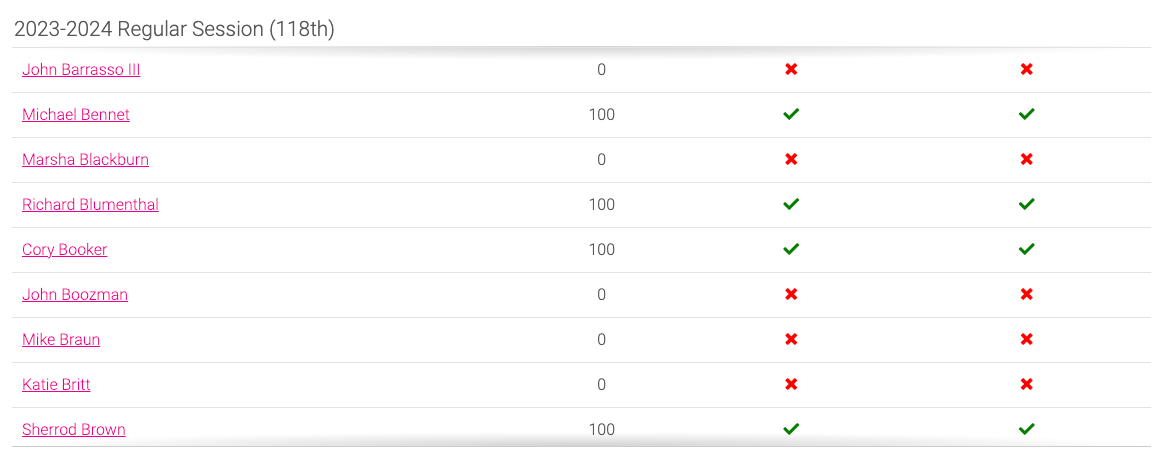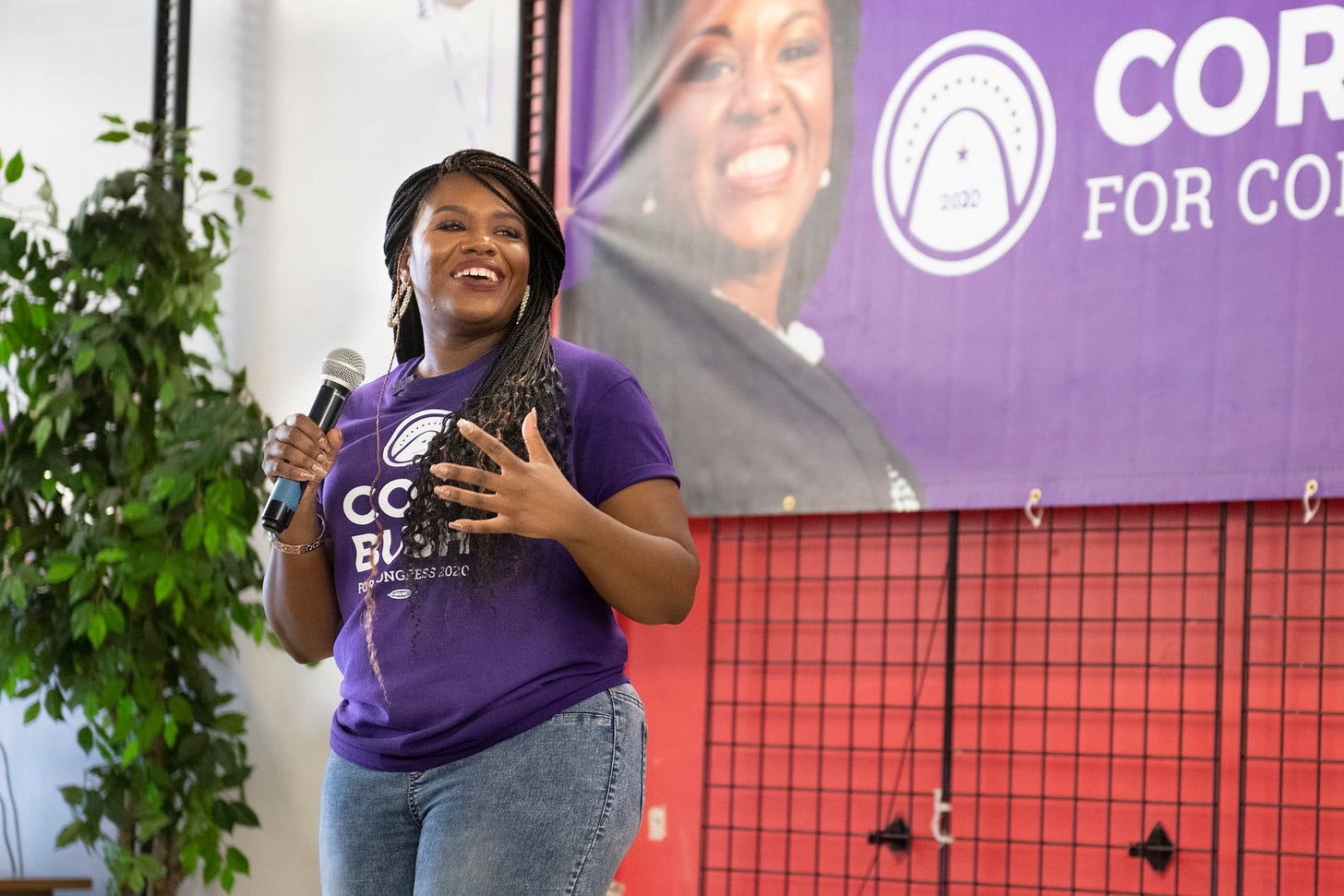4 Lessons The Left Can Learn From Ryan Grim’s New Book, “The Squad: AOC and the Hope of a Political Revolution”
And broader thoughts on the progressive politicians.
Earlier this week, a video of protestors confronting Congresswoman Alexandria Occasio-Cortzez went viral. In the edited clip posted by FreedomNews, the protests implore AOC to call Israel’s assault on Gaza a genocide. “I already did,” the Congresswoman can be heard saying.
The episode set off another round of “AOC discourse,” the Groundhog’s Day of online debates attempting to surmise the New York Congresswoman’s true intentions. Except for Donald Trump, no politician has energized modern politics as much as Alexandria Ocasio Cortez, who is no stranger to these episodes. Since upsetting Joe Crowley and winning New York’s 14th Congressional seat in 2018, AOC has become a political lightning rod, drawing bolts from every corner of the political spectrum. Republicans hate her because she’s a left-of-center woman of color, corporate Democrats despise the progressive movement she represents as a threat to their offices, and Trotsky-esque leftists have claimed her willingness to work within the system proves she’s no better than Nancy Pelosi (some have even claimed she’s a CIA op.) While AOC is the cultural focal point, the Squad, the media monicker for the group of young (by Congressional standards), progressive congresspeople, has amplified both outrage and excitement alike.

With bombastic op-eds and wild Twitter threads (both attacking and praising) the Squad every time they breathe, it’s been difficult to evaluate them on their political merits. That’s why I eagerly awaited Ryan Grim’s new book, The Squad: AOC and the Hope of a Political Revolution, hoping Grim’s reporting would provide a detailed look at the groups’ performance, warts and all.
Rather than offer my opinions about whether AOC and her colleagues are The Best Politicians Ever or The Worst Politicians Ever (Twitter has informed me these are the only two choices), I find it more valuable for leftists to approach Grim’s work for the purpose of learning lessons. What did the Squad do well? What are their flaws? And how can we, the political left that wants to fundamentally alter America’s capitalist society, leverage these politicians to achieve our goals?
Lessons To Learn
These aren’t the only lessons to learn from The Squad, but they’re the ones I find to be most valuable.
1. The Democrat Establishment Is More Threatened By Progressives Than Republicans
While conventional logic would lead one to believe that Donald Trump and the GOP are the primary target of the Democratic National Committee, Grim’s account of the Squad’s early years shows this is not the case. Following the 2018 midterms that brought the Squad to office, Democratic Congressman Josh Gottheimer led a public campaign to chastise Ilhan Omar and Rashida Tlaib as antisemites. Pointing to their criticism of AIPAC, Gottheimer enlisted Nancy Pelosi and DNC leadership to condemn Omar, which they did with a joint statement.
Keep in mind, this is in the Spring of 2019, just after the Democrats won huge margins in the fall midterm. Instead of putting forth a bold agenda that would position the Democratic Party to run against Trump in 2020, Gottheimer, Pelosi, and the Democratic establishment aimed their sights at the Squad, indicating who they saw as the true threat to their political careers. The establishment operatives aren’t wrong, per se, as corporate-backed Democrats in safe blue districts are more likely to be ousted by a progressive primary challenger than a Republican opponent, but it shows their priorities lie in their personal stature, not the betterment of the American people.
This hostility continued long past the early years. In September of 2021, Pelosi added a billion dollars in funding for Israel’s Iron Dome to an unrelated debt ceiling bill, simply to put pressure on the Squad. And it worked. After a tumultuous battle and an outpouring of calls driven by AIPAC, AOC cast a “present’ vote that earned her rightful criticism from the left.
“Why use this moment, Omar asked (house Majority Leader Steny Hoyer) to force a fiery debate on the House floor? Doing it this way would put a target on the backs of (the Squad), she said — with part of her aware that was the precise purpose of hurrying with the vote.”
2. Progressive Politicians Have A Steep Learning Curve
Broadly speaking, leftists are divided on how to view progressive Democrats. One camp favors the Squad and advocates supporting them, while the second believes whatever revolutionary energy they had entered Congress with has been captured and neutered by the DNC. Grim’s book shows that there was a third, more realistic option: The Squad were unskilled political newcomers. Before entering Congress, AOC had no prior political experience, while Ayana Presley and Ilhan Omar had served at the state level. Alternatively, Nancy Pelosi, Chuck Schumer, and other long-serving Democrats had decades of backroom experience. As Grim details, the establishment actors routinely outmaneuvered the Squad, without them ever realizing they were opponents.
According to Grim, AOC expected to be welcomed and onboarded to Congress as would any other incoming Democrat. She was not. Democratic colleagues refused to “show her the ropes,” leaving her to figure out how Congress worked on their own. While trying to do so, Democratic leadership forced them into wedge votes (like the Iron Dome funding), enlisted groups like AIPAC and Democratic Majority for Israel to attack them, and used obscure tactics to block them, such as calling upon the previously unknown parliamentarian to block a $15 minimum wage. It’s like AOC the Squad was trying to learn how to play football while being blitzed by the Dallas Cowboys.
“The fight for a $15 minimum wage was set back when the Senate parliamentarian advised Schumer it con’s of through under the complex rules of reconciliation. The parliamentarian’s role, legally, is only to advise… but she had grown so comfortable that her entire ‘ruling’ on the minimum wage consisted of a single line simply stating that it couldn’t go through.”
No politician is above reproach, and there’s a laundry list of valid criticisms the left has for the Squad. But, we should also recognize their disadvantage against the Democratic elite and afford them a degree of grace. It’s important to remember that they’ve had to learn the complexities of government by themselves while trying to advance a progressive agenda. This is a tall task for any Representative, never mind one who is actively suppressed and attacked by their own party.
3. Progressives Can’t Be Scared To Lose
Like every other politician who has set foot inside the chambers of government, I’ve got bones to pick with AOC, Bowman, Omar, etc. Overall, my complaints can be boiled down to them being too conservative. While I recognize the aforementioned difficulties, I believe the Squad should buck the party more. Perhaps they didn’t realize establishment Democrats didn’t want them until only recently, but still, more opposition would have galvanized outside energy and shown Democratic leadership the Squad was willing to fight.
For example, Grim details the time AOC tried to pressure Congress to repeal the Hyde Amendment, which prevents public money from going to abortion providers. She was opposed by Planned Parenthood, who publicly condemned the Amendment. While AOC wanted to call a vote to repeal Hyde, Planned Parenthood feared it would fail and they’d have to “score” the Democrats who voted against it, endangering them of losing upcoming elections. Faced with opposition from the DNC-aligned nonprofit world, the vote was dropped.

Far too often progressives get into office and “play it safe,” fretting about the potential impact a controversial vote could have in the upcoming election. As almost every policy the left stands for will bring special interest money down on them, this fear renders once-powerful leftists little more than centrists. When Obama pulled the public option out of the Affordable Care Act for fear it would put him in political danger, the result was Obamacare - a carbon copy of the Heritage Foundation’s free-market healthcare plan. Given this effect, we should encourage progressive politicians and groups to take a risk for our values, even if they endanger their seats. After all, what good is having the seat if you’re not going to use it?
4. We Gotta Chill
Grim does a good job summarizing the Squad’s relationship with the broader left, which predominantly came through interactions on Twitter. While the left is much more expansive than those who post online, as that is where its most vocal members reside, it becomes a de-facto message board for progressive politics. Needless to say, it’s often toxic.
Grim recalls the 20202 “Force the Vote” episode, in which online personalities demanded the Squad withhold votes from Pelosi for Speaker of the House unless she held a vote on Medicare For All. The argument quickly escalated, with many online calling AOC, Omar, and Presley sellouts for not following the flimsy strategy of podcasters and commentators. A similar outcry arose from a protest AOC attended after the overturning of Roe v. Wade. When AOC was arrested, she put her arms behind her back, as the organizing marshals told her to do. (This is so the cops can’t twist your arm while cuffing you.) As soon as videos of the event hit the internet, many claimed she was “faking being handcuffed for the cameras” and scolded her for not doing more, though what she should have been doing is still vague.
As with most hellscapes that arise from www dot twitter dot com, it’s good advice for all of us to take a deep breath. Not every event, word, or pose needs to be critically dissected and elevated to the importance of the splitting of the Comintern. Politicians might cast a bad vote or make a mistake. As we know from Grim’s reporting, these low-importance, high-intensity breakdowns of the progressive base discourage electeds while achieving nothing, besides making the left look increasingly looney to potential allies.

Overall, The Squad: AOC and the Hope of a Political Revolution is a great book that makes the tedium of lawmaking something I never thought it could be: entertaining. Given the important lessons that lie within its intriguing pages, I suggest anyone interested in progressive politics give it a read to better understand the challenges and rewards facing the leftist politicians of today and tomorrow.
If you enjoyed this article, make sure you add your name to my email list to receive future articles straight to your inbox.
What are your thoughts on the state of AOC and the Squad? Do you agree or disagree with my analysis? Share your thoughts in the comments.







This is a good, solid analysis. It's also worth remembering that every single time the members of the Squad go up for re-election, they are hit with a DNC or DNC surrogate super-PAC backed primary challenger; whereas more establishment Democrats are protected from such by threats of "blacklisting" by the DNC of anyone who would work on a challenger's campaign.
The Democrats are not on our side; and should always be treated like they're not.